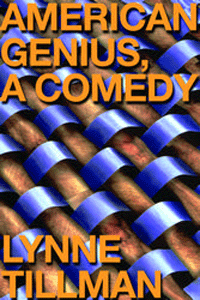American Genius: A Comedy.
This spring, National Geographic published a photograph of a small prayer book, written in French, and bound in what appears to be leather. According to the article, the leather that is used in bookbinding is very thin, about the thickness of three sheets of paper, and is given its firmness by stretching it over a stiff backing. The leather on this little book of prayers looks worn and supple, a medium tan color, with the wrinkles and scarring that are inherent to leather products visible on its surface. When the book was examined more closely, it was discovered that the leather was made of human skin.
In Judaism, religious books are ornately decorated as an expression of love for the word of God. Islam created beautiful forms of calligraphy to give glory to religious expression in their holy books. What does it say, then, about the religious views of an individual who binds the word of God in human skin?
My thoughts kept coming back to this macabre little book when I read Lynne Tillman’s fifth novel, American Genius: A Comedy. As morbid and repulsive as the concept is, I couldn’t shake the thought that a binding of human leather suited the novel.
American Genius is overwhelmed by obsession, a myriad jumble of interwoven thoughts kaleidoscoping throughout the mind of Helen, a woman living in an unspecified residential institution. She keeps revolving the same interests around in her mind, some of which include:
The Zulu language
Pets
Chair design
That Tarot reading she got that one time
The meals served in the institution
Manson girl and convicted killer Leslie Van Houten
Fabric, and, in a very much related way,
Skin.
Who we are is what covers us, she believes, and of course because she is a sensitive person, she has sensitive skin that she is constantly caring for. As she weaves the thick tapestry of obsessions that occupy her time, it becomes painfully clear how limiting an obsessive mind and a deeply neurotic personality can be. She returns repeatedly to her same sticking points, giving the reader bits of new information each time, and in the cracks between the thick defensive wall she has surrounded herself with, her life is able to happen.
Months ago, when the second or assistant cook arrived, she was in the kitchen and around the dining room first at breakfast, then at dinner, when she had met the standards set by the head cook, and, instantly, she reminded me of Leslie Van Houten, because her hands were unsightly, she was a nailbiter, and though she was clean and scrubbed, a reluctance or remorse in her stained her solid body and made it unsightly, and, though armored, or because, she had an almost palpable vulnerability.
The entire novel is written in a distinctive, rhythmic cadence, words swimming in the opaque tidal pools of each sentence. It’s brilliant how Tillman used sentence structure to immerse the reader completely into the internal monologue of the narrator. Much of the novel flows in a leisurely, uninhibited way, reflecting the copious amounts of time Helen jealously protects and guards almost as much as she protects her sensitive skin, but when Helen is forced to interact with another person – the young kitchen assistant who lusts after her, the eccentric woman who abruptly appears throughout the novel to ask loud, demanding questions, or the other residents who are deeply involved in obsessions of their own (although they all share the same obsession with complaining about the food served in the institution), the language becomes abrupt, choppy, and the reader feels Helen’s apprehension and fear of losing her carefully maintained self control.
In one of the best parts of the book, she comes across the kitchen assistant in a local coffee shop, and when she joins him and his friends at a table, she flatly responds to their questions with odd tangents about Leslie Van Houten. During his overtures to her, rather than responding in the traditional way, she instead becomes engrossed in the construction of the chair she is sitting on. Clearly there is not much room in her thoughts for the kitchen assistant, beyond the fact that he has appealing skin.
American Genius: A Comedy has an incredibly rich texture, revealing so much about the nature of the human mind and human relationships, proving that the threads of both intertwine to form a tapestry, a story of living fabric that is told on the skin of us all.
________________________
American Genius: A Comedy
by Lynne Tillman
Soft Skull Press
September, 2006
320pp, Paperback
ISBN: 1-933368-44-6
Saturday, September 16, 2006
<< Home
